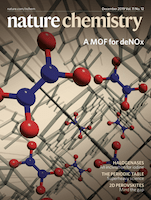
Nature Chemistry
Scope & Guideline
Pioneering Research in Chemistry and Engineering.
Introduction
Aims and Scopes
- Catalysis and Reaction Mechanisms:
The journal extensively covers advancements in catalysis, including both homogeneous and heterogeneous systems, exploring mechanisms that enhance reaction efficiency and selectivity. - Materials Chemistry:
Nature Chemistry publishes research on the synthesis, characterization, and application of novel materials, including polymers, nanomaterials, and biomaterials, emphasizing their chemical properties and potential uses. - Chemical Biology and Bioinorganic Chemistry:
The journal highlights studies that integrate chemistry with biology, focusing on the role of metal ions in biological systems and the development of chemical tools for probing biological questions. - Computational Chemistry and Machine Learning:
Nature Chemistry features articles that utilize computational methods and machine learning to predict chemical behavior, optimize reactions, and design new materials. - Sustainable and Green Chemistry:
Research that addresses environmental impact and sustainability in chemical processes is a core focus, promoting greener methods and materials. - Interdisciplinary Approaches:
The journal encourages interdisciplinary research that combines chemistry with physics, materials science, and engineering, showcasing innovative methodologies and applications.
Trending and Emerging
- Machine Learning and Artificial Intelligence in Chemistry:
The integration of machine learning techniques for predicting chemical properties and reaction outcomes is rapidly gaining traction, transforming how researchers approach chemical problems. - Sustainable Chemistry Practices:
There is a growing emphasis on sustainability, with research focusing on environmentally friendly chemical processes and materials that minimize waste and energy consumption. - Chemical Biology and Therapeutics:
Research at the interface of chemistry and biology, particularly in drug discovery and development, is increasingly prevalent, reflecting a strong interest in therapeutic applications. - Nanotechnology and Advanced Materials:
The exploration of nanomaterials and their applications in various fields, including electronics, medicine, and energy storage, is becoming a key focus area. - Dynamic and Responsive Materials:
Research on materials that can respond to external stimuli, such as light or heat, is emerging as a significant trend, with applications in smart materials and drug delivery systems.
Declining or Waning
- Traditional Organic Synthesis:
There has been a noticeable decrease in the emphasis on traditional organic synthesis techniques, possibly due to a shift towards more efficient, automated, and greener synthesis methods. - Inorganic Chemistry Focus:
The journal appears to have shifted away from purely inorganic chemistry topics, as the integration of inorganic principles into broader chemical applications gains more attention. - Basic Physical Chemistry Studies:
Publications that focus solely on fundamental physical chemistry without direct application or interdisciplinary connections are becoming less common, indicating a trend towards applied research.
Similar Journals

RUSSIAN CHEMICAL REVIEWS
Shaping the Future of Chemical ResearchRUSSIAN CHEMICAL REVIEWS, published by the esteemed ND Zelinsky Institute of Organic Chemistry, RAS, stands as a prominent platform for disseminating high-quality research in the diverse field of chemistry. With an ISSN of 0036-021X and an E-ISSN of 1468-4837, this journal has earned its place in the Q1 quartile of Chemistry (miscellaneous) for 2023, reflecting its outstanding impact and rigorous peer-review process. The journal encompasses a wide array of topics within chemistry, providing critical reviews that advance understanding and foster collaboration among researchers, professionals, and students globally. With its consistent publication since 1970, RUSSIAN CHEMICAL REVIEWS not only serves as a valuable resource for the latest advancements in the field but also plays a crucial role in shaping future research directions. The journal is based in the Russian Federation, with its office located at 47 Leninsky Pr, Moscow 119991, RUSSIA. As an essential reference for those in the chemical sciences, it provides an ideal avenue for authors looking to publish impactful reviews that contribute to the broader scientific community.
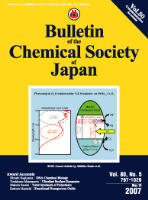
BULLETIN OF THE CHEMICAL SOCIETY OF JAPAN
Catalyzing Progress: Connecting Ideas in ChemistryBULLETIN OF THE CHEMICAL SOCIETY OF JAPAN, published by the esteemed Chemical Society of Japan, serves as a pivotal platform for the dissemination of cutting-edge research in the multifaceted field of chemistry. With an ISSN of 0009-2673 and an E-ISSN of 1348-0634, this journal has been integral in fostering the growth of chemical sciences globally since its inception in 1965. The journal holds an impressive Q2 ranking in the Chemistry (miscellaneous) category, indicating its relevance and influence within the academic community, as reflected by its Scopus rank of #104/408, placing it in the 74th percentile. Although it is not an open-access journal, its rich content, which spans a wide range of topics in general chemistry, remains highly valued by researchers, professionals, and students alike, affirming its crucial role in advancing both theoretical knowledge and practical applications in chemistry. As it converges towards 2024, the bulletin continues to uphold its commitment to excellence in scientific communication and research dissemination in Japan and beyond.
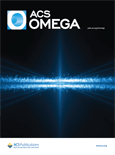
ACS Omega
Pioneering Research, Shaping the Future of Chemistry.ACS Omega is a prominent open-access journal published by the American Chemical Society that has been serving the global research community since its inception in 2016. With ISSN 2470-1343, it focuses on a wide array of topics within the realm of Chemistry and Chemical Engineering, making it a crucial platform for researchers and practitioners aiming to disseminate significant findings across these disciplines. The journal maintains an impressive standing, ranking in the Q2 quartile for both Chemical Engineering and Chemistry categories, highlighting its impact and relevance in contemporary research. Additionally, with its Scopus ranks placing it within the top 24% and 27% of General Chemistry and General Chemical Engineering respectively, ACS Omega continues to foster innovation and facilitate collaboration among scientists. As an Open Access journal, it ensures that research outputs are freely available to all, enhancing the accessibility and visibility of contributors’ work, thus playing a critical role in advancing scientific knowledge globally from its headquarters in Washington, D.C.
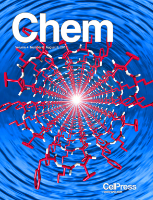
Chem
Empowering Global Access to Chemical KnowledgeChem, published by CELL PRESS, is a renowned academic journal that has rapidly established itself as a leading platform for cutting-edge research in diverse areas such as biochemistry, chemical engineering, materials chemistry, and environmental chemistry. Released under the ISSN 2451-9294, this esteemed journal has achieved an impressive Q1 category ranking across multiple disciplines in 2023, highlighting its significant impact and prominence within the academic community. With a strong focus on innovative studies and interdisciplinary approaches, Chem fosters a vibrant dialogue among researchers, professionals, and students, making it an indispensable resource for those seeking to advance their knowledge and contribute to the evolving field of chemistry. As an open access journal, it aims to democratize knowledge, ensuring that critical research is accessible to a global audience. With its headquarters based in Cambridge, MA, it continues to lead the charge in the dissemination of pivotal findings that shape our understanding of chemical sciences.
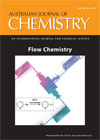
AUSTRALIAN JOURNAL OF CHEMISTRY
Advancing chemical knowledge, one article at a time.The Australian Journal of Chemistry, with an ISSN of 0004-9425 and an E-ISSN of 1445-0038, is a distinguished publication from CSIRO PUBLISHING, dedicated to advancing the field of chemistry since its inception in 1948. Based in Australia, this journal serves as a platform for original research articles, reviews, and innovative studies that encompass a wide spectrum of chemical disciplines, aiming to foster communication and collaboration among researchers globally. Despite its Q3 ranking in the Chemistry (Miscellaneous) category and standing at rank #236 in Scopus’ general chemistry classification, it remains an essential resource for professionals and students seeking to stay informed about emerging trends and discoveries in chemistry. The journal does not offer open access, emphasizing the premium quality of peer-reviewed content that adheres to rigorous academic standards. By bridging theory and practice, the Australian Journal of Chemistry continues to play a crucial role in shaping the future of chemical sciences.

JACS Au
Connecting researchers to the pulse of cutting-edge chemistry.JACS Au, published by the American Chemical Society, is a premier open access journal dedicated to advancing research in the rapidly evolving fields of analytical chemistry, organic chemistry, and theoretical chemistry. Since its inception in 2021, JACS Au has quickly established itself as a leading platform for high-quality research, reflected in its Q1 rankings across multiple categories for 2023, including Organic Chemistry and Analytical Chemistry. The journal focuses on innovative methodologies and applications that drive the discipline forward, making it an essential resource for researchers, professionals, and students alike. With an impressive Scopus ranking, consistently placing in the top tiers of its categories, and offering a broad range of access options for its readership, JACS Au aims to foster collaboration and disseminate transformative ideas that impact the global scientific community. Exploring diverse topics within chemistry, this journal provides a vital conduit for sharing groundbreaking research and enhancing scientific dialogue.

JOURNAL OF CHEMICAL SCIENCES
Empowering Chemists: Open Access to Scientific ExcellenceThe JOURNAL OF CHEMICAL SCIENCES, published by the Indian Academy of Sciences, is a premier academic journal that serves the global community of chemists and researchers. With an ISSN of 0974-3626 and an E-ISSN of 0973-7103, this journal is pivotal in disseminating high-quality research across diverse areas of chemical sciences. As of 2023, it holds a respectable Q3 ranking in the field of Chemistry (miscellaneous) and ranks #215 out of 408 in General Chemistry according to Scopus, reflecting its commitment to advancing the discipline. Operating in an open-access format, the journal ensures that research findings are readily accessible to a broader audience, fostering collaboration and innovation. Established in 1980 and continuing to evolve, the journal's scope encompasses fundamental and applied chemistry, and aims to bridge gaps between theoretical and practical applications. With a mission to support the scientific community, the JOURNAL OF CHEMICAL SCIENCES is an essential resource for researchers, professionals, and students alike, providing a platform for the exchange of groundbreaking ideas and discoveries.
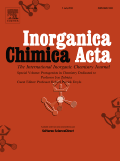
INORGANICA CHIMICA ACTA
Cultivating Insights in Inorganic and Materials ChemistryINORGANICA CHIMICA ACTA is a distinguished journal published by Elsevier Science SA, focusing on the dynamic fields of inorganic chemistry, materials chemistry, and physical and theoretical chemistry. Established in 1967, the journal continues to contribute to the scientific community with a commitment to high-quality research and innovation, boasting a 2023 Scopus ranking that places it at the forefront of its category, including a notable rank of #25 out of 79 in Inorganic Chemistry. Researchers can access a wealth of knowledge through its assemblage of influential articles; though it does not offer open access, the journal remains a key resource in the Netherlands and beyond. With an impact factor reflective of its rigorous editorial standards and engagement, INORGANICA CHIMICA ACTA is essential for scholars and professionals seeking to deepen their understanding and advance their research in these interconnected scientific domains.
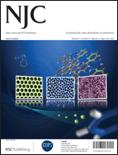
NEW JOURNAL OF CHEMISTRY
Unveiling New Horizons in Material SciencesNEW JOURNAL OF CHEMISTRY, published by the prestigious Royal Society of Chemistry, serves as a vital platform for the dissemination of research in the dynamic fields of chemistry, catalysis, and materials science. With an impressive ISSN of 1144-0546, this journal boasts a rich history, having been established in 1996, and is set to continue its impactful publication through 2024. The journal is recognized in several categories, achieving a Q2 ranking in both chemistry and materials chemistry, and a Q3 rank in catalysis, reflecting its significance within these disciplines. Researchers will find it particularly noteworthy that the journal holds an esteemed position in the Scopus rankings, with a 65th percentile standing in general chemistry. Though it currently operates on a subscription model, its commitment to advancing the frontiers of chemistry makes it an essential resource for academics, professionals, and students seeking to keep abreast of the latest advancements and innovative methodologies in their fields.

Trends in Chemistry
Charting New Territories in Chemical DiscourseTrends in Chemistry, published by CELL PRESS, stands at the forefront of the multidisciplinary field of chemistry, offering cutting-edge research and insights that shape contemporary scientific discourse. With its impressive rank of #12 out of 408 in the General Chemistry category of Scopus—placing it in the 97th percentile—this journal represents the pinnacle of academic excellence and innovation. Since its inception in 2019, it has provided a platform for sharing pivotal developments and trends in the chemical sciences, making it an invaluable resource for researchers, professionals, and students alike. Although it operates under subscription access, Trends in Chemistry is dedicated to expanding the frontiers of knowledge and fostering a vibrant academic community. Its Q1 quartile ranking underscores its significance and authority in the field, ensuring that it remains an essential reference point for anyone engaged in the ever-evolving world of chemistry. With its impactful contributions, Trends in Chemistry not only reflects current advancements but also drives future innovation in the discipline.